Paintings and Sculpture of Ed Mell
 Saturday, January 1, 2011 at 6:15PM Tweet
Saturday, January 1, 2011 at 6:15PM Tweet By Donna Poulton
Ed Mell is one of the most ingenious and successful artists working in the West today, but like most people, Mell’s career path wasn’t evident early on. After graduating, he moved to New York City to work as a graphic designer and within two years launched his own company, Sagebrush Studios, which became an immediate success with such well-known clients as Cheerios and RCA.
Ed Mell is represented by both the Overland Galery (in Scottsdale) and Medicine Man Gallery (in Tucson and Santa Fe). The above video was shot in Medicine Man Gallery.
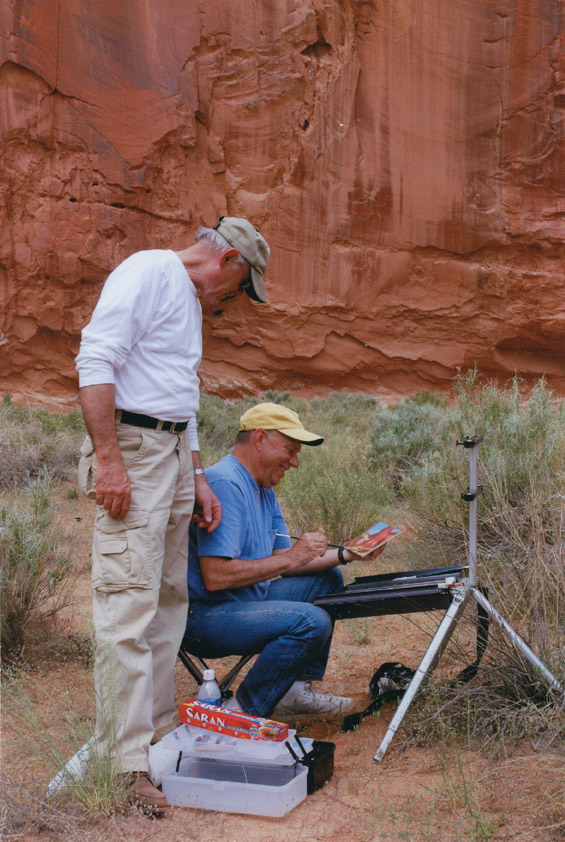 Photograph of Gary E. Smith (standing) and Ed Mell. Courtesy of Larry Clarkson.
Photograph of Gary E. Smith (standing) and Ed Mell. Courtesy of Larry Clarkson.
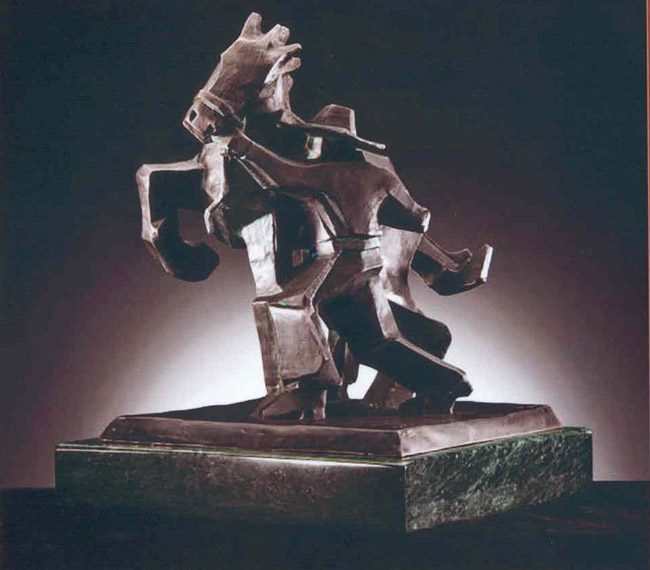 Sidestepper. Photo courtesy of Overland Gallery.
Sidestepper. Photo courtesy of Overland Gallery.
Preferring the West, Mell returned to his hometown, Phoenix, Arizona in 1973. He worked part time as an illustrator and part time developing his painting skills into what would become a unique and recognizable style. By 1978 he had become a full time artist creating paintings that moved between hard edged representation and much more abstract work; always with the familiar angles and edges. By choosing to paint a broken terrain, he has naturally cubed the landscape by dividing the images in his work into small multiple areas.
Mell told Southwest Art Magazine: “I work from nature, and sometimes I push it a little further…Seeing the real thing has much more impact than a photographic representation of nature, so in order to duplicate nature, I like to push it a little further and bring back some of the impact that nature has in real life.”
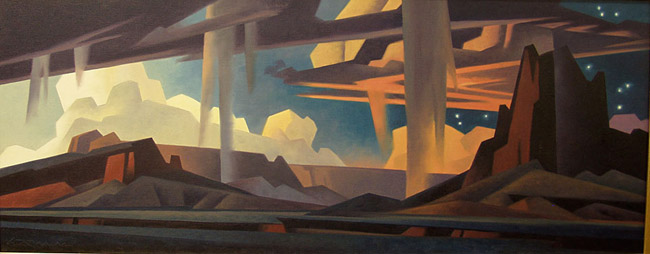 From Day to Night. Photo courtesy of Overland Gallery.
From Day to Night. Photo courtesy of Overland Gallery.
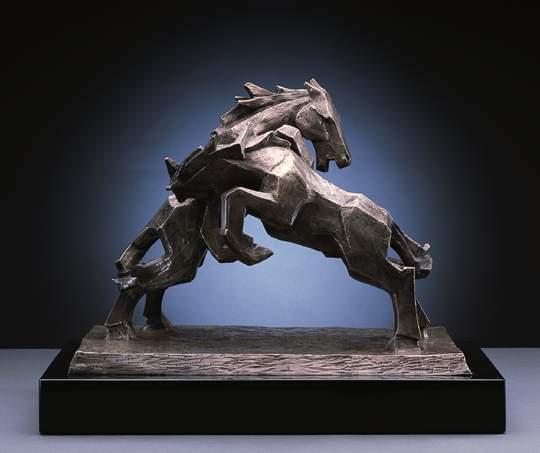 Dueling Fury. Photo courtesy of Overland Gallery.
Dueling Fury. Photo courtesy of Overland Gallery.
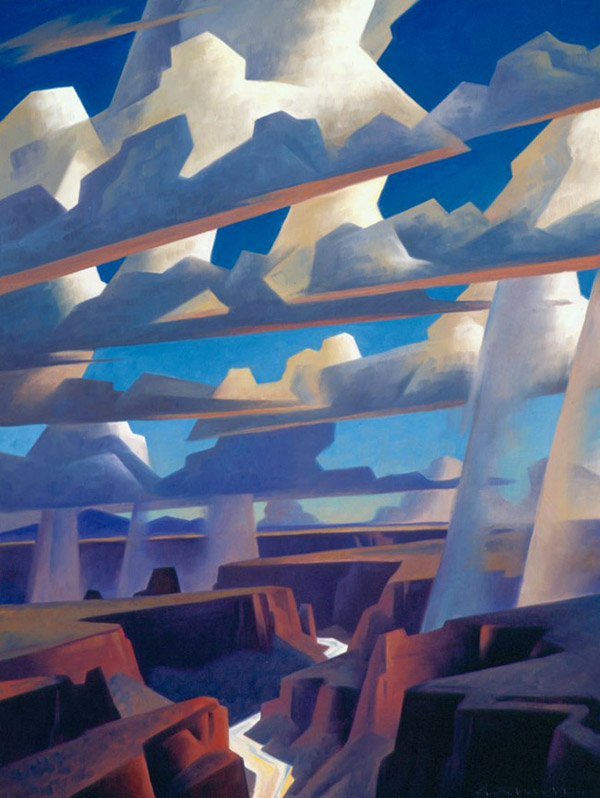 Canyon Light and Rain. Photo courtesy of Painters of Utah's Canyons and Deserts.
Canyon Light and Rain. Photo courtesy of Painters of Utah's Canyons and Deserts.
Like the Cubists, Mell has taken natural forms—clouds, sky, rain, lighting, cliffs, buttes and canyons—and ‘analyzed’ them for reinterpretation into geometric forms. His work also resonates with elements of chaos theory and the study of approximate fractals in which patterns in nature appear identical at different scales; the repeating motifs are easily found in natural formations such as clouds, mountain ranges, lightning and river networks.
Fractals seem more evident, more repetitive in a cubist interpretation of nature. In both Wingate Cliffs and Canyon, Light and Rain the canyons and bluffs are often connected by long cylinders representing shafts of light, rain or lightning—emphasizing the interconnection of the elements.
“…there are certain moods to the landscape, and sometimes that’s the main focus, to capture the mood rather than an actual depiction of [a place]…Some kind of invention happens, almost like auto-painting, but in a calculated way. Once you have enough confidence that you’re not nervous about where it will go you can have freedom and fun with it.”
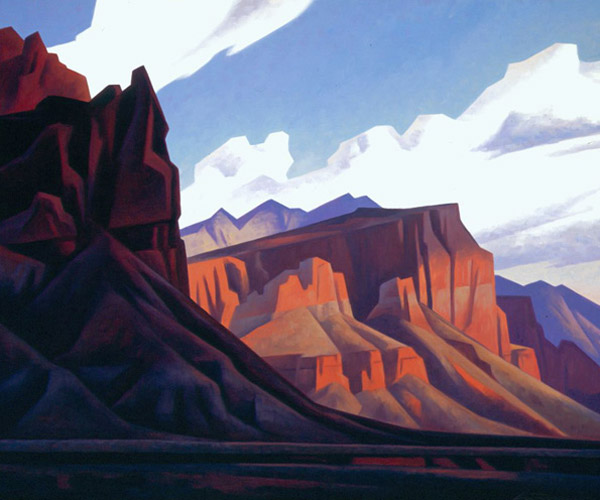 Wingate Cliffs. Photo courtesy of Painters of Utah's Canyons and Deserts.
Wingate Cliffs. Photo courtesy of Painters of Utah's Canyons and Deserts.
To read more about Ed Mell:
Donald J. Hagerty: Leading the West
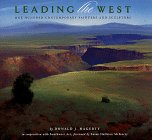
Donna L. Poulton and Vern Swanson: Painters of Utah’s Canyons and Deserts

Donald Hagerty: Beyond the Visible Terrain
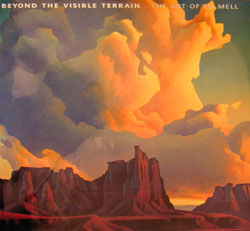
Southwest Art: October 2002, April 2004, March 2004
Art of the West: May, 2003
Western Art Collector: March 2008, January 2009, February 2010
 Arizona,
Arizona,  Donna Poulton,
Donna Poulton,  Ed Mell,
Ed Mell,  Painting,
Painting,  Sculpture,
Sculpture,  Western Art | in
Western Art | in  Arizona,
Arizona,  Ed Mell
Ed Mell 
Reader Comments (1)
Wow, these are gorgeous artworks!